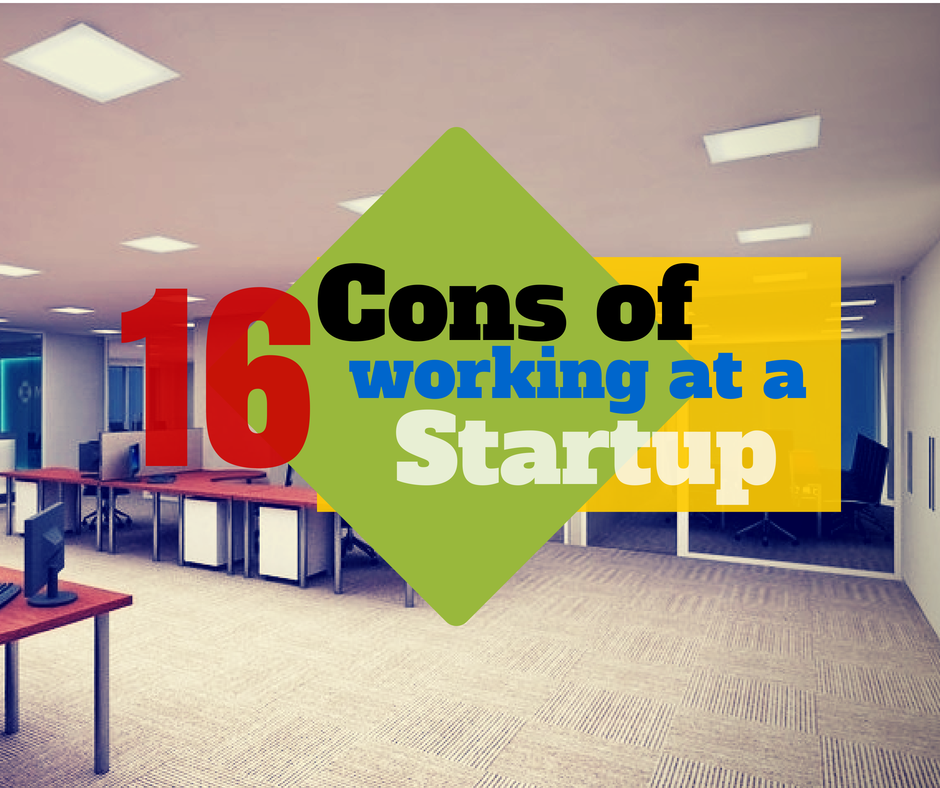Startups are the new things these days. When you hear companies like WhatsApp, Occulus get acquired and the amount of fabulous money some of its employees made, it makes you think hard about whether you should consider a career in startups.
Joining a startup is good or bad?
Let’s discuss the cons of join a startup company.
 So before you take the leap of joining a startup job, here’s a list of things you should brace your self before you take the plunge.
So before you take the leap of joining a startup job, here’s a list of things you should brace your self before you take the plunge.
Cons of Joining a Startup:
The following mentioned are few things you should understand before deciding on working in a startups
1. Lower Salary:
Most startups will offer you a low salary when compared to a more established company. Startups do offer equity, but that is worth anything only if the company is successful. Many startups sometimes make news for the outstanding startup compensation they pay for top talent.
That is usually after they are FUNDED and have acquired significant traction. Until that time, it’s a lower salary or no salary or a delayed salary if you are lucky.
2. Lower Job Security:
Larger companies usually ride out the troughs of the business cycle much more easily than startups.
Startups often don’t have that luxury as they often survive month to month if not day to day and cash flow is a perennial problem. So if there isn’t enough money in the bank to meet a few months of expenses, jobs are lost.
3. Longer hours:
Are you ready for working long hours?
Startups often work with rigid deadlines and there’s always less people and more things to get done. Be prepared to work weekends or woken up in the middle of the night, in case of any emergencies.
This just isn’t for a day, it probably is going to be this way for many months if not years. If you like your 9 to 6 job with long lunches then startups are not the place for you.
4. Learning to be Frugal:
Startups work on shoestring budgets or literally no budgets. They use free tools, free resources and discounted stuff.
So low cost airlines and discount travel deals are in and business class travel is out.
Inadequate resources
When working for a startup, they usually work very lean especially in the early days when they have no funding or customers or even a product to sell. This means that the normal resources that people take for granted in large companies don’t exist in startups.
5. Understand the value of time:
 For startups, its often a case of getting things done yesterday. So you have to have the discipline of getting things within time.
For startups, its often a case of getting things done yesterday. So you have to have the discipline of getting things within time.
Since there are less people and more things to get done, you will get pulled into many different issues. Learn to prioritize and put a premium on your time to get things done.
6. Work in an intense and focused environment:
Startups are usually charged up work places where things move quickly with lots of energy and passion.
This works both ways, as many times things get done on sheer adrenalin and motivation while in other instances, things get heated, leading to arguments and severe disagreements. Expect this to happen regularly for long periods of time.
7. “Work in a team” is a necessity:
 Startups work in groups of highly focused people. To get things done, team work is not just important, its absolutely essential. Its probably the reason why some startups succeed and some fail.
Startups work in groups of highly focused people. To get things done, team work is not just important, its absolutely essential. Its probably the reason why some startups succeed and some fail.
So ask yourself, if you can work with the same group of people over long periods of time during the day and night and still be happy to see each other at work the next day.
8. Do stuff that wasn’t mentioned in the Job Description:
Startups pull employees into whatever is the burning issue of the moment.
So when you work in startups and if you are a developer and the only sales person in your team fell sick, you might find yourself on your way to a pre-fixed sales meeting that was arranged after months of chasing the decision maker at a high potential customer organization. Be prepared for the unexpected.
9. Multitasking:
Being at a startup is a bit like being a working mom. You have to be able to run multiple tasks simultaneously and see them all through.
10. There’s no place to hide:
In a large company, work is distributed over a larger number of people and its usually easy for non- performers to hide behind the work done by others.
In Startups, where teams are small and even a single person’s work not being delivered makes an adverse impact. If you like to take things a bit easy in delivering your work, then startups won’t work for you.
11. Unstructured environment:
Startups don’t have time to put in place a lot of processes until they are really critical to the functioning.
So, your onboarding process was a quick 5 minute introduction speech to everyone at the office who sat In the same room. There wasn’t an employee handbook but the policies were made up as everyone went along.
12. Priorities change frequently:
 So your original plan was to target Global 2000 companies with your revolutionary product.
So your original plan was to target Global 2000 companies with your revolutionary product.
Your CEO attended a few investor meetings and startup conferences last week and you are now targeting Small and medium business with a revenue of $10 million or more.
Can you live with this sort of change priority, week on week, month on month?
13. Its not about the office or the carpet:
Fancy office digs usually cost a lot of money in rent. That’s not what prudent startups will think. They’d probably figure they can change the office carpet once there’s enough time and money to do it.
So be prepared to slog it out in make to do office that may not necessarily enhance your social quotient.
14. Perks? What perks?:
If you are expecting a gym, a food court, the secretary, the works, you’d be better off joining a larger company.
15. There is no classroom training:
 Startups often hire you to hit the ground running. Even if you are interning while you are still at college, startups will throw you at the deep end of the pool straight away.
Startups often hire you to hit the ground running. Even if you are interning while you are still at college, startups will throw you at the deep end of the pool straight away.
You have got to learn to swim on your own. There isn’t going to be a training manual or a training class at a fancy offsite venue.
16. Are you passionate about what you want to do?:
Lastly, but the most important piece, are you really passionate about what you want to do at the startup?
Do you believe in the vision or the work that you do or the difference the startup careers can make?
Whatever your reason to join startups, make sure that you firmly stick to the decision of joining startup.








































